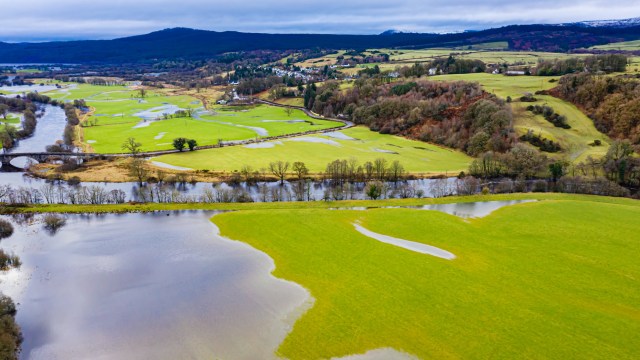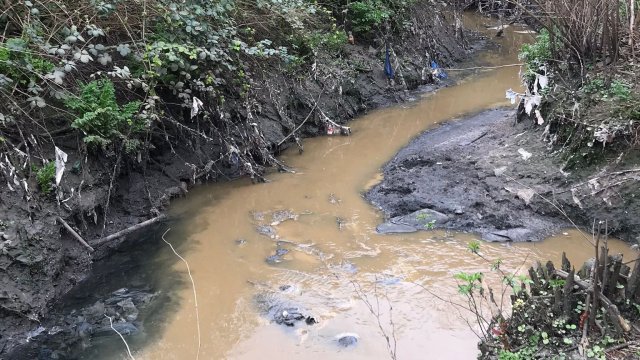A Brexit law change is set to worsen the state of Britain’s rivers as the Government ditches old EU rules designed to protect the waterways from agricultural pollution.
From 1 January, 2024, British farmers will no longer be forced to comply with a series of EU regulations designed to promote good environmental practice, including rules to reduce agricultural runoff into rivers.
Campaigners have criticised the move, telling i it is a “weakening of environmental standards” in what is already “a very bad situation“.
While ministers insist these standards will be upheld through the Government’s new post-Brexit agriculture regime, environmental groups warn of significant gaps that they say could lead to the further decline of Britain’s nature and water courses.
This post-Brexit regime, which is designed to reward farmers for protecting the environment, is currently being rolled out, with a limited number of farmers being able to access payments so far. The old EU system is in the process of being wound down and will come to a complete end in 2027.
“Given that we’re already in a very bad situation, why are we losing things… we’ve got this massive problem with water quality, but we’re regressing from the position that we’re in, which is terrible,” said Lydia Collas, senior policy analyst at the Green Alliance.
Agriculture is one of the largest sources of pollution for Britain’s rivers due to nutrient-rich soil, along with fertilisers and pesticides, being washed off into water bodies when it rains.
Intensive farming within river catchment areas has led to a massive decline in aquatic wildlife, as high nutrient levels in the water boost algae growth, restricting oxygen levels.
How agriculture impacts Britain’s rivers
Britain’s rivers are in a dire state. Just 14 per cent of England’s rivers have good ecological status, alongside zero rivers in Northern Ireland. Meanwhile, 40 per cent of Scotland’s rivers and 45 per cent of Wales’ are in good ecological health.
Agriculture is a major cause of pollution, affecting more than 60 per cent of England’s failing rivers, according to a recent research paper by the House of Commons.
Farmland contains high levels of nutrients, due to the use of fertilisers and manures. This creates a problem when soil ends up in rivers during periods of rainfall or heavy wind.
This nutrient-rich material disturbs river ecosystems as it causes algae to bloom, restricting the available oxygen for other organisms.
Some rivers, such as the River Wye, have been hugely impacted by intensive farming within the catchment area. Campaigners warn that the river’s Atlantic salmon population is facing extinction if the problem is not addressed.
Environmental groups fear that Britain’s heavily polluted rivers could now face further degradation due to the end of the EU rules, known as cross compliance, which UK farmers have been forced to adhere to in order to receive subsidies through the EU’s Common Agricultural Policy.
While many of the cross compliance regulations already exist in UK domestic law, environmentalists point to three significant gaps that will exist in Britain’s regulatory regime for farmers once the EU rules come to an end at the start of 2024.
Most crucial for rivers is a rule that forces farmers to create buffer strips to separate agricultural land from water bodies, thus reducing the risk of runoff.
Some rules to prevent soil erosion will also come to an end, such as the obligation on farmers to keep green cover, such as crops or grass, on their soil over winter to reduce the chance of it being blown into rivers.
A more basic obligation to “take reasonable precautions” to prevent soil erosion exists within UK regulations.
The final regulatory gap concerns regulations around hedgerows. While less directly connected to river health, environmental groups say these rules are essential as hedgerows are an important habitat for wildlife and have potential to store high amounts of carbon.
Without these rules in place, environmentalists fear some farmers could regress to farming in a way that is more damaging to nature.
“Farmers want to do the right thing generally, but if the Government isn’t incentivising this then it does mean the system’s stacked against having these protections,” said Hannah Blitzer, senior policy officer at Wildlife and Countryside Link.
“Cross compliance as a mechanism wasn’t perfect, but it upheld quite an important principle in that to receive public money from agriculture and land management there was a basic baseline that had to be met and with its removal. That’s not as strong anymore,” added Philip Carson, UK policy lead at the Nature Friendly Farming Network.
Environmental groups have generally supported the Government’s decision to move away from the EU’s Common Agricultural Policy because it rewards farmers based on the size of their land and has been widely criticised for promoting unsustainable forms of farming. But they remain concerned about gaps in the regulation.
The Government is currently transitioning towards its own farming subsidy system, called the Environmental Land Management Scheme (ELMS), that instead rewards farmers for work to protect nature and boost food security.
Through this programme farmers can access money to carry out work to improve water quality in their surrounding area, for example through improving their soil health or the storage of slurry, a natural fertiliser made from manure.
But while nature groups support the move on paper, they say that many farmers are struggling to access these schemes post-Brexit and warn that they must be underpinned by strong regulation.
“It is necessary that we switch from the direct payments to [ELMS] but we do need effective regulations to protect the environment and effectively level the playing field. Not every farmer is going to be involved in ELMS,” said Ms Blitzer.
Mr Carson was also supportive of the move to ELMS, but said the regulatory gaps meant the Government was at risk of paying farmers to do things that “everyone should be doing anyway as part of good practice”.
He said Brexit provided the Government with the perfect opportunity to reform the system for farming regulation, which he said is currently “piecemeal”.
In 2018, ministers attempted to beef up regulations around agriculture and water quality through the introduction of the Farming Rules for Water, but Ms Blitzer said these rules are poorly enforced and more ambition is needed.
Without stronger regulation, she said the Government will fail to hit its legally binding environmental targets, including its pledge to halt the decline of nature by 2030 and reduce “diffuse pollution”, which includes agricultural runoff, by 40 per cent by 2038.
“With these rules ending we have this opportunity to become a lot more ambitious, to have these protections and make sure that these environments are healthy for river wildlife, but also people that want to bathe and swim in rivers as well,” she said.
A spokesperson for the Department for Environment, Food and Rural Affairs said: “We have recently consulted on continuing hedgerow protections after the end of cross compliance and will publish a summary of responses document which will include our next steps shortly
“We are committed to protecting watercourses as set out in the Farming Rules for Water. We are working with regulators to implement a more preventative, advice-led approach to monitoring and enforcement and since 2021 the Environment Agency has undertaken more than 7,000 farm inspections resulting in over 11,400 improvement actions.”

